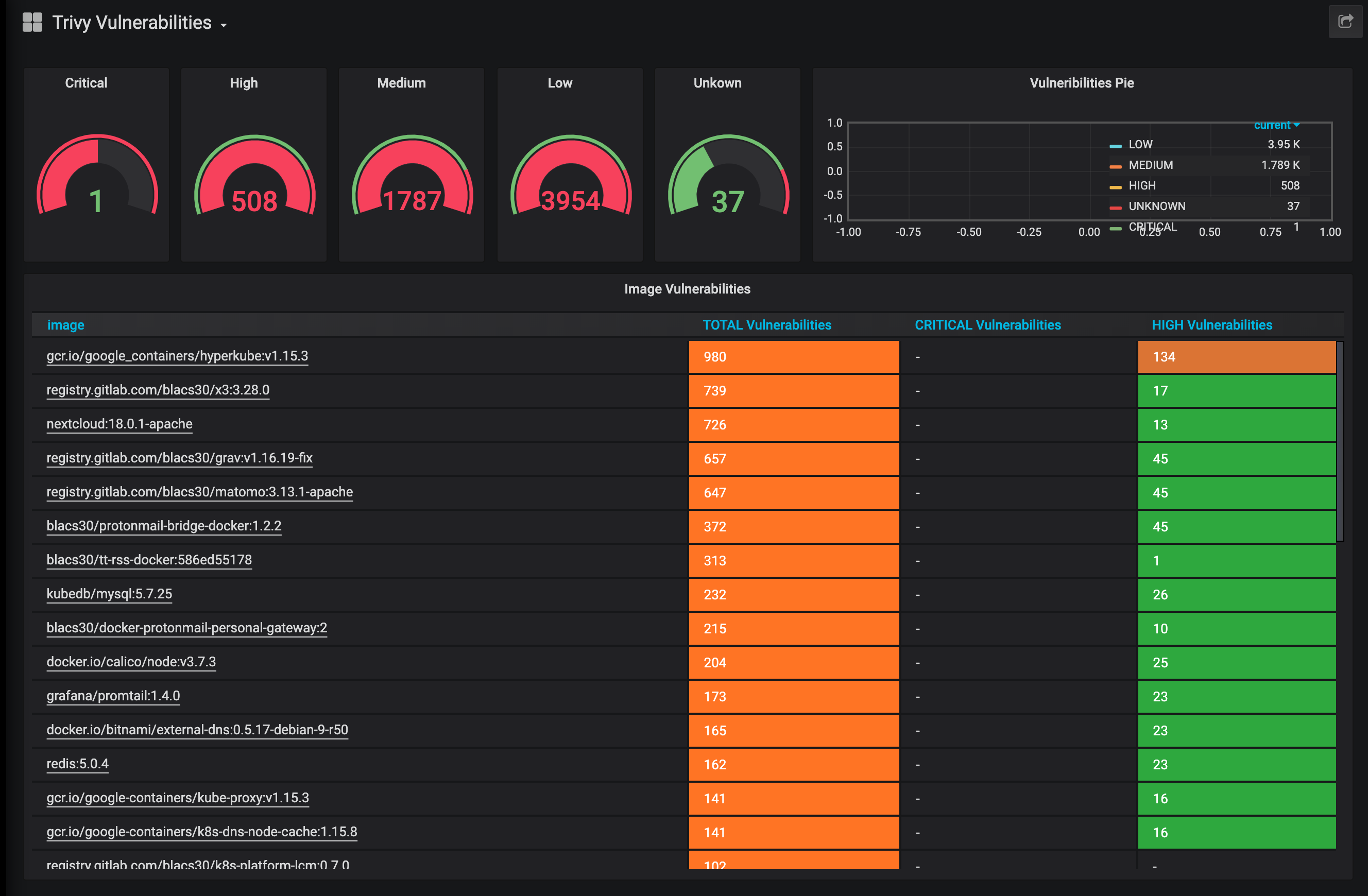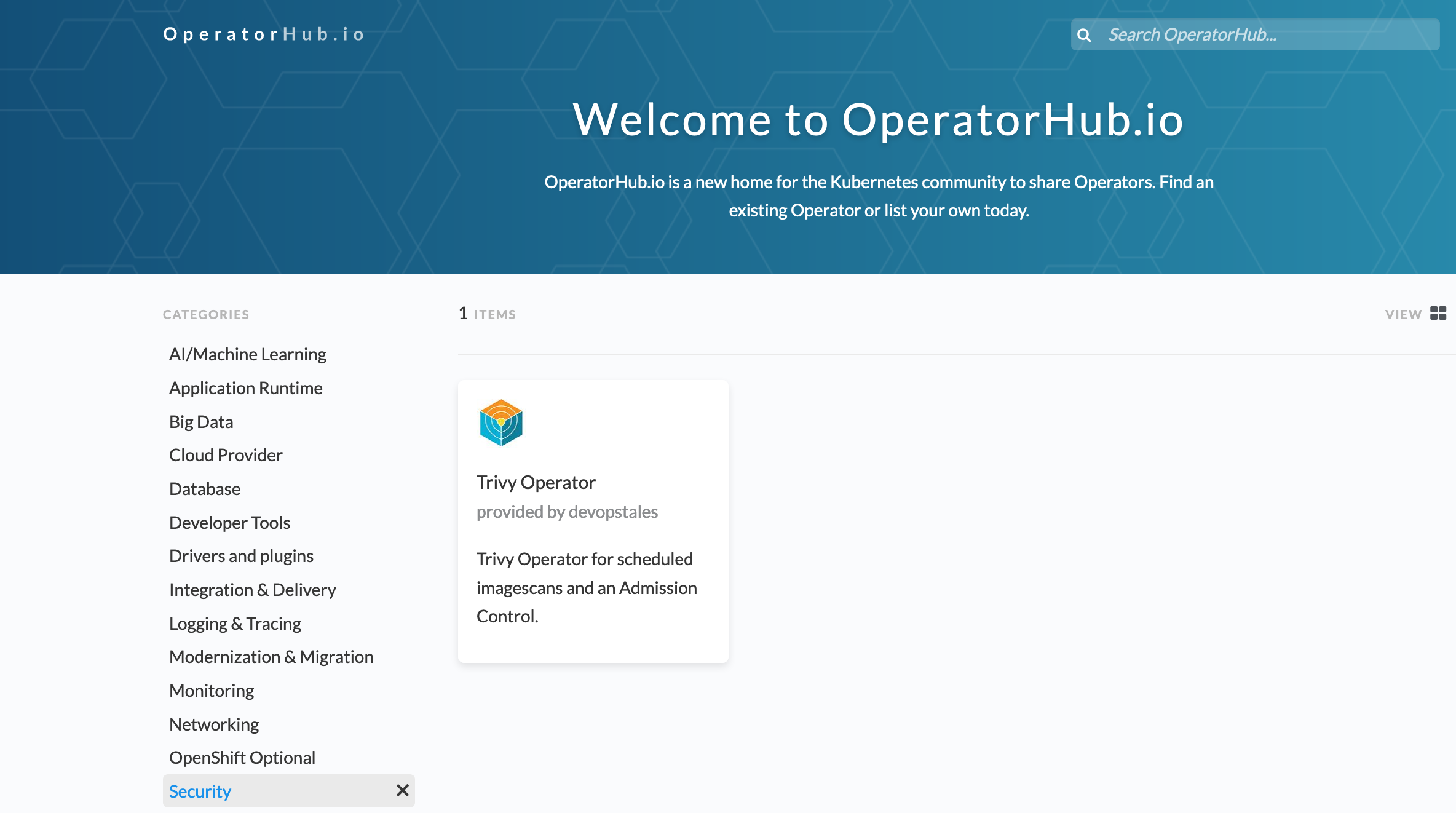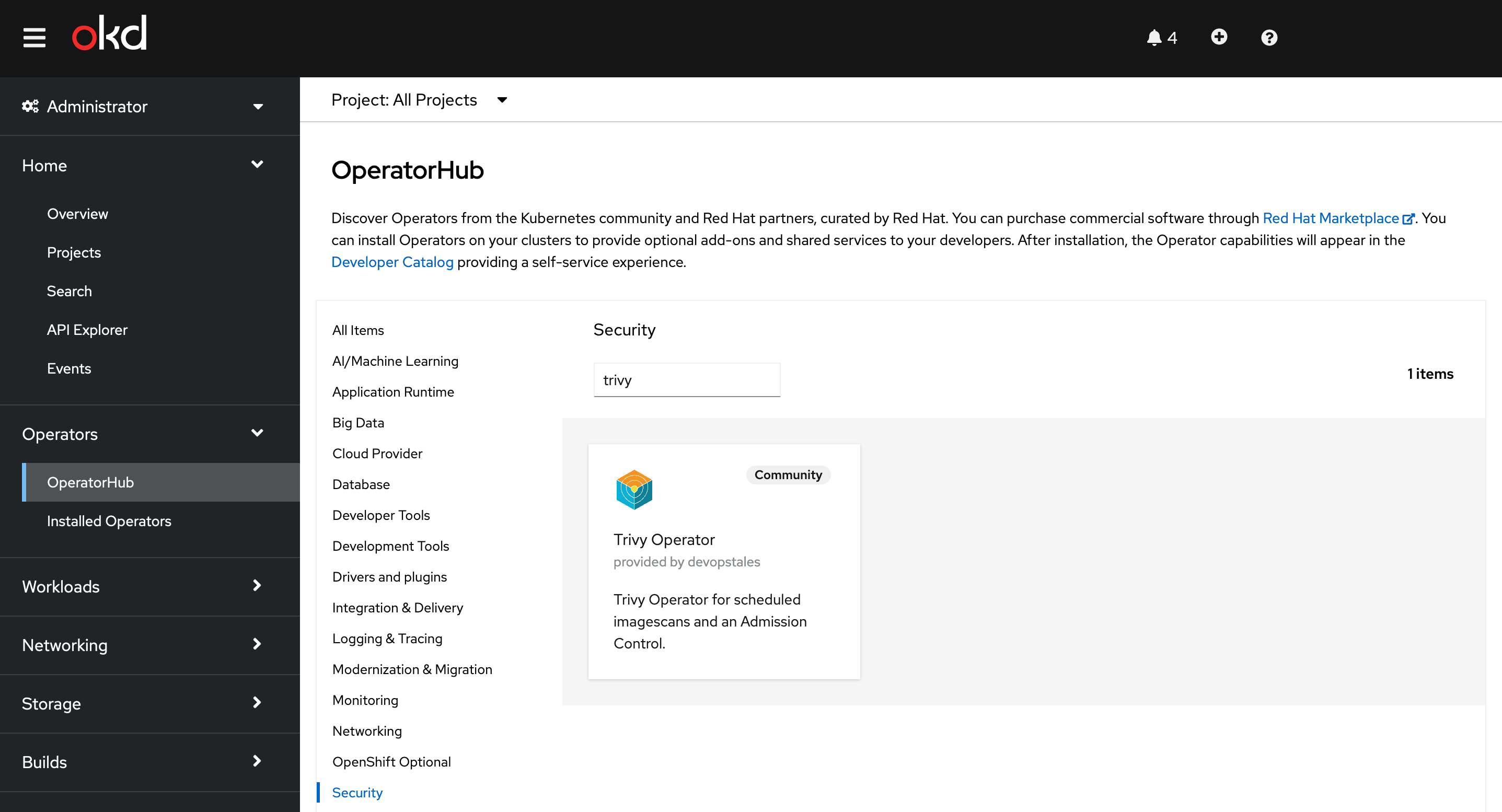trivy-operator 2.2: Patch release for Admisssion controller
Today I am happy to announce the release of trivy-operator 2.2. This blog post focuses on the functionality provided by the trivy-operator 2.2 release.
What is trivy-operator?
Trivy-operator is a Kubernetes Operator based on the open-source container vulnerability scanner Trivy. The goal of this project is to provide a vulnerability scanner that continuously scans containers deployed in a Kubernetes cluster. Built with Kubernetes Operator Pythonic Framework (Kopf) There are a few solution for checking the images when you deploy them to the Kubernetes cluster, but fighting against vulnerabilities is a day to day task. Check once is not enough when every day is a new das for frats. That is why I created trivy-operator so you can create scheduled image scans on your running pods.
Bugfixes
With the release of trivy-operator 2.2 I fixed a few minor problems:
- Add Advanced Grafana Dashboard and Change Prometheus Endpoint
- Now the Admission Controller Function generates it’s own self signed certificate for the
ValidatingWebhook

Trivy Image Validator
The admission controller function can be configured as a ValidatingWebhook in a k8s cluster. Kubernetes will send requests to the admission server when a Pod creation is initiated. The admission controller checks the image using trivy if it is in a namespace with the label trivy-operator-validation=true.
You can define policy to the Admission Controller, by adding annotation to the pod trough the deployment:
spec:
...
template:
metadata:
annotations:
trivy.security.devopstales.io/medium: "5"
trivy.security.devopstales.io/low: "10"
trivy.security.devopstales.io/critical: "2"
...
Where you can find:
With the release of trivy-operator 2.2 I published trivy-operator with OperatorFramework to OperatorHub:


Usage
To ease deployment I created a helm chart for trivy-operator.
helm repo add devopstales https://devopstales.github.io/helm-charts
helm repo update
Create a value file for deploy:
cat <<'EOF'> values.yaml
image:
repository: devopstales/trivy-operator
pullPolicy: Always
tag: "2.2"
imagePullSecrets: []
podSecurityContext:
fsGroup: 10001
fsGroupChangePolicy: "OnRootMismatch"
serviceAccount:
create: true
annotations: {}
name: "trivy-operator"
monitoring:
port: "9115"
serviceMonitor:
enabled: false
namespace: "kube-system"
storage:
enabled: true
size: 1Gi
NamespaceScanner:
crontab: "*/5 * * * *"
namespaceSelector: "trivy-scan"
registryAuth:
enabled: false
registry:
- name: docker.io
user: "user"
password: "password"
githubToken:
enabled: false
token: ""
EOF
When the trivy in the container want to scan an image first download the vulnerability database from github. If you test many images you need a githubToken overcome the github rate limit and dockerhub username and password for overcome the dockerhub rate limit. If your store you images in a private repository you need to add an username and password for authentication.
The following tables lists configurable parameters of the trivy-operator chart and their default values.
| Parameter | Description | Default |
|---|---|---|
| image.repository | image | devopstales/trivy-operator |
| image.pullPolicy | pullPolicy | Always |
| image.tag | image tag | 2.1 |
| imagePullSecrets | imagePullSecrets list | [] |
| podSecurityContext.fsGroup | mount id | 10001 |
| serviceAccount.create | create serviceAccount | true |
| serviceAccount.annotations | add annotation to serviceAccount | {} |
| serviceAccount.name | name of the serviceAccount | trivy-operator |
| monitoring.port | prometheus endpoint port | 9115 |
| serviceMonitor.enabled | enable serviceMonitor object creation | false |
| serviceMonitor.namespace | where to create serviceMonitor object | kube-system |
| storage.enabled | enable pv to store trivy database | true |
| storage.size | pv size | 1Gi |
| NamespaceScanner.crontab | cronjob scheduler | “*/5 * * * *” |
| NamespaceScanner.namespaceSelector | Namespace Selector | “trivy-scan” |
| registryAuth.enabled | enable registry authentication in operator | false |
| registryAuth.registry | registry name for authentication | |
| registryAuth.user | username for authentication | |
| registryAuth.password | password for authentication | |
| githubToken.enabled | Enable githubToken usage for trivy database update | false |
| githubToken.token | githubToken value | "" |
kubectl create ns trivy-operator
kubens trivy-operator
helm upgrade --install trivy devopstales/trivy-operator -f values.yaml
Monitoring
Trivy-operatos has a prometheus endpoint op port 9115 and can be deployed wit ServiceMonitor for automated scrapping.
curl -s http://10.43.179.39:9115/metrics | grep trivy_vulnerabilities
# HELP trivy_vulnerabilities_sum Container vulnerabilities
# TYPE trivy_vulnerabilities_sum gauge
trivy_vulnerabilities_sum{exported_namespace="trivytest",image="docker.io/openshift/mysql-56-centos7:latest",severity="scanning_error"} 1.0
trivy_vulnerabilities_sum{exported_namespace="trivytest",image="docker.io/nginxinc/nginx-unprivileged:latest",severity="UNKNOWN"} 0.0
trivy_vulnerabilities_sum{exported_namespace="trivytest",image="docker.io/nginxinc/nginx-unprivileged:latest",severity="LOW"} 83.0
trivy_vulnerabilities_sum{exported_namespace="trivytest",image="docker.io/nginxinc/nginx-unprivileged:latest",severity="MEDIUM"} 5.0
trivy_vulnerabilities_sum{exported_namespace="trivytest",image="docker.io/nginxinc/nginx-unprivileged:latest",severity="HIGH"} 7.0
trivy_vulnerabilities_sum{exported_namespace="trivytest",image="docker.io/nginxinc/nginx-unprivileged:latest",severity="CRITICAL"} 4.0
trivy_vulnerabilities_sum{exported_namespace="trivytest",image="docker.io/library/nginx:1.18",severity="UNKNOWN"} 0.0
trivy_vulnerabilities_sum{exported_namespace="trivytest",image="docker.io/library/nginx:1.18",severity="LOW"} 126.0
trivy_vulnerabilities_sum{exported_namespace="trivytest",image="docker.io/library/nginx:1.18",severity="MEDIUM"} 25.0
trivy_vulnerabilities_sum{exported_namespace="trivytest",image="docker.io/library/nginx:1.18",severity="HIGH"} 43.0
trivy_vulnerabilities_sum{exported_namespace="trivytest",image="docker.io/library/nginx:1.18",severity="CRITICAL"} 21.0
# HELP trivy_vulnerabilities Container vulnerabilities
# TYPE trivy_vulnerabilities gauge
trivy_vulnerabilities{exported_namespace="trivytest",image="docker.io/nginxinc/nginx-unprivileged:latest",installedVersion="2.2.4",pkgName="pkgName",severity="LOW",vulnerabilityId="CVE-2011-3374"} 1.0
trivy_vulnerabilities{exported_namespace="trivytest",image="docker.io/nginxinc/nginx-unprivileged:latest",installedVersion="8.32-4",pkgName="pkgName",severity="LOW",vulnerabilityId="CVE-2016-2781"} 1.0
trivy_vulnerabilities{exported_namespace="trivytest",image="docker.io/nginxinc/nginx-unprivileged:latest",installedVersion="8.32-4",pkgName="pkgName",severity="LOW",vulnerabilityId="CVE-2017-18018"} 1.0
trivy_vulnerabilities{exported_namespace="trivytest",image="docker.io/nginxinc/nginx-unprivileged:latest",installedVersion="7.74.0-1.3",pkgName="pkgName",severity="CRITICAL",vulnerabilityId="CVE-2021-22945"} 1.0
trivy_vulnerabilities{exported_namespace="trivytest",image="docker.io/nginxinc/nginx-unprivileged:latest",installedVersion="7.74.0-1.3",pkgName="pkgName",severity="HIGH",vulnerabilityId="CVE-2021-22946"} 1.0
trivy_vulnerabilities{exported_namespace="trivytest",image="docker.io/nginxinc/nginx-unprivileged:latest",installedVersion="7.74.0-1.3",pkgName="pkgName",severity="MEDIUM",vulnerabilityId="CVE-2021-22947"} 1.0
trivy_vulnerabilities{exported_namespace="trivytest",image="docker.io/nginxinc/nginx-unprivileged:latest",installedVersion="7.74.0-1.3",pkgName="pkgName",severity="LOW",vulnerabilityId="CVE-2021-22898"} 1.0
